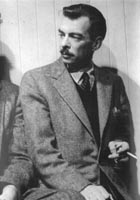Robinson At Home Poem by Weldon Kees
Robinson At Home
Curtains drawn back, the door ajar.
All winter long, it seemed, a darkening
Began. But now the moonlight and the odors of the street
Conspire and combine toward one community.
These are the rooms of Robinson.
Bleached, wan, and colorless this light, as though
All the blurred daybreaks of the spring
Found an asylum here, perhaps for Robinson alone,
Who sleeps. Were there more music sifted through the floors
And moonlight of a different kind,
He might awake to hear the news at ten,
Which will be shocking, moderately.
This sleep is from exhaustion, but his old desire
To die like this has known a lessening.
Now there is only this coldness that he has to wear.
But not in sleep.—Observant scholar, traveller,
Or uncouth bearded figure squatting in a cave,
A keen-eyed sniper on the barricades,
A heretic in catacombs, a famed roué,
A beggar on the streets, the confidant of Popes—
All these are Robinson in sleep, who mumbles as he turns,
“There is something in this madhouse that I symbolize—
This city—nightmare—black—”
He wakes in sweat
To the terrible moonlight and what might be
Silence. It drones like wires far beyond the roofs,
And the long curtains blow into the room.
This poem has not been translated into any other language yet.
I would like to translate this poem
An autobiographical poem, which is really about Weldon Kees. I can almost see the curtains in his room. Kees wrote about the dark side of life; he had a desire to die in his sleep, but lesser now. He dreams vivid, exotic dreams. It was indeed tragic that Weldon Kees took his own life, throwing himself off a high bridge.